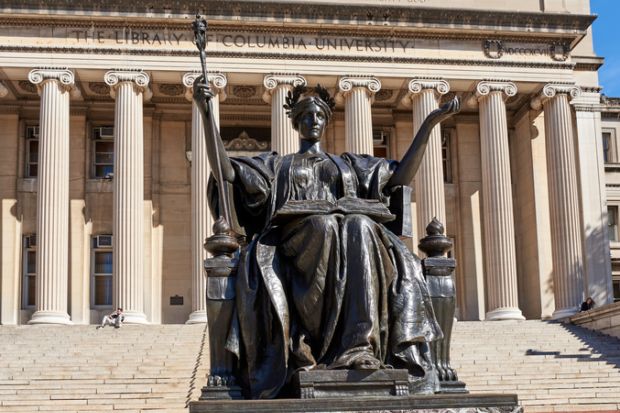Student workers have reached a tentative first contract agreement with Columbia University, following years of negotiations and a 10-week strike that threatened undergraduates’ credit hours for the autumn semester.
The four-year deal includes a major win for the union, given Columbia’s reluctance to agree to it: access to full arbitration or mediation for students’ claims of discrimination and harassment. This extends to sexual harassment and misconduct claims, after accusers have exhausted the university’s own internal avenues for investigations and appeals.
Access to binding, independent arbitration in misconduct cases became a goal for several graduate student unions around the time of the #MeToo movement, which highlighted the potential conflicts of interest in university-run misconduct investigations. Student workers at Harvard University achieved access to arbitration in their recent contract deal, for instance – but only for cases that do not involve alleged violations of federal laws against gender-based discrimination. Columbia’s deal includes arbitration options for cases that do involve Title IX of the Education Amendments of 1972.
Relatedly, the new Columbia contract includes transitional funding for up to one semester for students who say their relationship with their academic adviser is unhealthy or characterised by discrimination, harassment or other inappropriate behaviour.
Other major contract wins for Columbia’s United Auto Workers–affiliated union relate to pay, benefits and union recognition.
If the contract is ratified, Columbia PhD students will see retroactive pay increases of no less than 4 per cent this academic year, plus an additional 2 per cent intended to cover union dues. That’s followed by 3 per cent raises in each of the next three years. Twelve-month appointment minimum salaries after dues will be $43,100 (£31,800). Summer stipends will grow, to $5,500 in the first year of the contract.
The deal also guarantees minimum pay parity among PhD students across academic programmes; according to information from the union, students in programmes such as social work are significantly underpaid relative to colleagues in other programmes, and to the high costs associated with living in New York.
Master’s and undergraduate student workers included in the unit will see retroactive pay increases of no less than 5 per cent this year and 3 per cent annually thereafter. Minimum hourly pay will be $21.
On benefits, the university will pay 75 per cent of dental insurance premiums for PhD students and their dependents and offer vision coverage.
Students whose research was impacted by Covid-19 are also eligible for more funding under the contract.
A sweeping 2016 decision by the National Labor Relations Board in favour of the Columbia union opened the door not just to graduate student worker unions at private institutions, but also to undergraduate workers being included in those unions. Columbia and its student workers have since disagreed over who should be part of the unit there, but the new deal extends coverage to the scope of the NLRB’s original certification decision, including some undergraduates.
The recent strike, which started on 3 November, was the longest in higher education in over a decade, according to information from the National Center for the Study of Collective Bargaining in Higher Education and the Professions at Hunter College of the City University of New York. It was also the third time the Student Workers of Columbia went on strike since the NLRB’s 2016 decision.
Columbia student workers last went on strike last spring over protracted contract negotiations. Negotiators eventually agreed to a contract deal, but union members rejected the proposal in a ratification vote.
This time around feels different, with Columbia agreeing for the first time to key union wants such as the third-party arbitration, full recognition of every instructional or research student worker currently in the unit, and 75 per cent dental coverage for doctoral students.
Union members will begin voting on the contract itself on 22 January, but the initial vote to end the strike was decisive, with 94 per cent of voters in favour.
“We are thrilled to reach an agreement with Columbia after seven years of building toward this first contract,” Nadeem Mansour, union bargaining committee member and PhD candidate in Middle Eastern, south Asian and African studies, said in a statement. “What our members achieved is impressive, but this is only the start. We look forward to building on our strong union culture to ensure the university continues to meet the needs of student workers.”
The stakes of this strike were higher than ever, with the university threatening to withhold spring appointment letters from striking workers and students halting campus operations in protest. Undergraduate instructors pleaded with Columbia to end the strike, saying they didn’t know if students would be able to get full credit for the autumn due to missed contact hours during the work stoppage.
Columbia referred questions about autumn undergraduate credit to a bargaining committee announcement about the tentative deal, which says that “the university has robust plans underway to ensure that all students whose education was disrupted by the strike will complete their academic work consistent with university policy and state and federal guidelines. We will be inviting student employees who have been on strike to engage in that work, and they will be fully paid for the work they perform.”
Provost Mary Boyce said in a separate statement: “I am optimistic that when the new academic term begins on 18 January, Columbia will fully return to the normal rhythm of academic life, and to the pursuit of intellectual accomplishment and personal fulfilment that brings each of us to this great university.”
This is an edited version of a story which first appeared on Inside Higher Ed.
Register to continue
Why register?
- Registration is free and only takes a moment
- Once registered, you can read 3 articles a month
- Sign up for our newsletter
Subscribe
Or subscribe for unlimited access to:
- Unlimited access to news, views, insights & reviews
- Digital editions
- Digital access to THE’s university and college rankings analysis
Already registered or a current subscriber? Login








